In wat volgt hebben we een aantal interessante boeken voor jullie op een rijtje gezet. Hierbij gaat het van 'heel toepasbaar binnen organisaties' tot echte 'wetenschappelijke verdieping'. Telkens is er een thematische opsplitsing gemaakt die het makkelijk maakt om te filteren en net dát boek te vinden dat je echt nodig hebt. Geniet ervan!
De geknipte genen
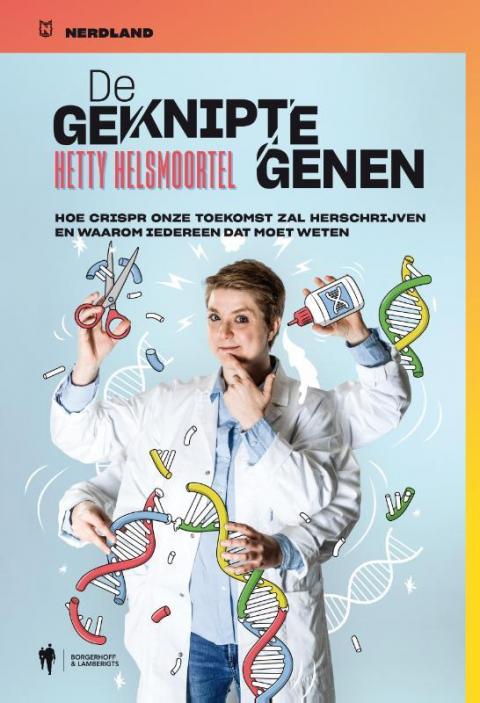
Hoe CRISPR onze toekomst zal herschrijven en waarom iedereen dat moet weten.
Het gebeurt niet elke dag, maar soms wordt er een ontdekking gedaan die de samenleving helemaal op zijn kop zet. Ooit was dat de beheersing van het vuur of het begin van de landbouw, recenter de auto of het internet. Vandaag is dat CRISPR, de uitvinding van de eeuw, alleen weet u dat nog niet. Tot nu.
Wat is CRISPR? Het korte antwoord: een revolutionaire techniek om aanpassingen uit te voeren in het DNA van eender welk organisme. Het langere antwoord wordt u in dit boek, gegeven door Hetty Helsmoortel, CRISPR-expert en verhalenverteller pur sang. In haar glasheldere en meeslepende stijl frist de auteur eerst uw voorkennis op van DNA, met alles wat je moet weten om CRISPR te begrijpen. Daarna toont ze wat kan en wat al is. Overtuigd dat ie-der-een moet begrijpen wat CRISPR is, maakt zij de materie behapbaar voor ons allen.
Waarom moet u dit weten? Omdat CRISPR prachtige kansen biedt, maar ook gevaren en een hoop ethische dilemma’s. Nu het genetisch aanpassen van mensen mogelijk wordt, vindt Helsmoortel het hoog tijd dat we onszelf vragen stellen. Baby’s die geen HIV meer kunnen krijgen? Een nieuwe kankertherapie? Wat als intelligentie of geaardheid genetisch beïnvloedbaar zijn? Wat moeten we met deze technologie? Dit is een must-read voor iedereen die de 21e eeuw wil begrijpen, een boek voor iedereen die wil deelnemen aan het debat over onze toekomst
The Greatest Story Ever Told...So Far Why Are We Here
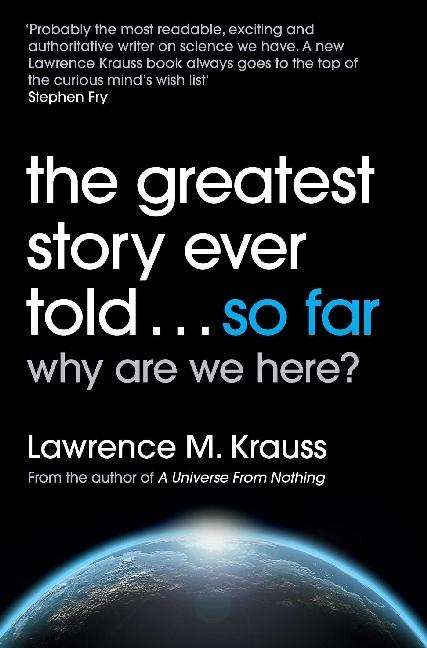
'Probably the most readable, exciting and authoritative writer on science we have. A new Lawrence Krauss book always goes to the top of the curious mind's wish list.' Stephen Fry
" I loved the fight scenes and the sex scenes were excellent ." (Eric Idle)
'In the span of a century, physics progressed from skepticism that atoms were real to equations so precise we can predict properties of subatomic particles to the tenth decimal place. Lawrence Krauss rightly places this achievement among the greatest of all stories, and his book-at once engaging, poetic and scholarly -tells the story with a scientist's penetrating insight and a writer's masterly craft.' (Brian Greene, author of The Elegant Universe, and Director, Center for Theoretical Physics, Columbia University)
"Unlike some very clever scientists, Lawrence Krauss is not content to bask on the Mount Olympus of modern physics. A great educator as well as a great physicist , he wants to pull others up the rarefied heights to join him. But unlike some science educators, he doesn't dumb down. In Einstein's words, he makes it 'as simple as possible but no simpler.'" (Richard Dawkins, author of The Magic of Reality)
"In every debate I've done with theologians and religious believers their knock-out final argument always comes in the form of two questions: Why is there something rather than nothing? and Why are we here? The presumption is that if science provides no answers then there must be a God. But God or no, we still want answers. In A Universe From Nothing Lawrence Krauss, one of the biggest thinkers of our time, addressed the first question with verve, and in The Greatest Story Ever Told he tackles the second with elegance. Both volumes should be placed in hotel rooms across America, in the drawer next to the Gideon Bible ." (Michael Shermer, Publisher Skeptic magazine, columnist Scientific American, Presidential Fellow Chapman University, author The Moral Arc.)
" A Homeric tale of science, history, and philosophy revealing how we learned so much about the universe and its tiniest parts." (Sheldon Glashow, Nobel Laureate, 1979 in physics)
" The Greatest Story Ever Told-So Far ranges from Galileo to the LHC and beyond. It's accessible, illuminating, and surprising-an ideal guide for anyone interested in understanding our accidental universe ." (Elizabeth Kolbert, Pulitzer Prize-winning author of The Sixth Extinction)
"College students, hippies, squares, Christians, Muslims, democrats, republicans, libertarians, theists, even atheists-all of us-sit around BS-ing like: 'So, how did all this, I mean everything, all of us, the whole universe, you know, man, everything, how did this all get here?' While we were doing that, Lawrence Krauss and people like him were doing the work to figure it out. Then Krauss wrote this great book about it. 'Wow, man, you mean, like we're getting closer to really knowing? I guess we'll have to go back to talking about politics and sex.'" (Penn Jillette, author of Presto!)
"Discovering the bedrock nature of physical reality ranks as one of humanity's greatest collective achievements. This book gives a fine account of the main ideas and how they emerged. Krauss is himself close to the field, and can offer insights into the personalities who have led the key advances. A practiced and skilled writer, he succeeds in making the physics 'as simple as possible but no simpler.' I don't know a better book on this subject ." (Martin Rees, author of Just Six Numbers)
"It is an exhilarating experience to be led through this fascinating story , from Galileo to the Standard Model and the Higgs boson and beyond, with lucid detail and insight, illuminating vividly not only the achievements themselves but also the joy of creative thought and discovery,
The Fearless Organization
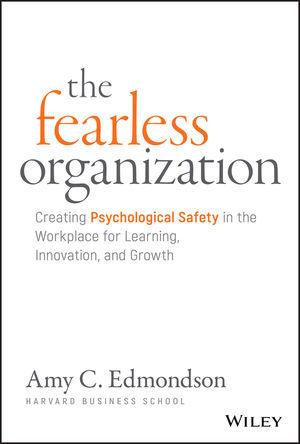
Creating Psychological Safety in the Workplace for Learning, Innovation, and Growth.
Conquer the most essential adaptation to the knowledge economy
The Fearless Organization: Creating Psychological Safety in the Workplace for Learning, Innovation, and Growth offers practical guidance for teams and organizations who are serious about success in the modern economy. With so much riding on innovation, creativity, and spark, it is essential to attract and retain quality talent--but what good does this talent do if no one is able to speak their mind? The traditional culture of "fitting in" and "going along" spells doom in the knowledge economy. Success requires a continuous influx of new ideas, new challenges, and critical thought, and the interpersonal climate must not suppress, silence, ridicule or intimidate. Not every idea is good, and yes there are stupid questions, and yes dissent can slow things down, but talking through these things is an essential part of the creative process. People must be allowed to voice half-finished thoughts, ask questions from left field, and brainstorm out loud; it creates a culture in which a minor flub or momentary lapse is no big deal, and where actual mistakes are owned and corrected, and where the next left-field idea could be the next big thing.
This book explores this culture of psychological safety, and provides a blueprint for bringing it to life. The road is sometimes bumpy, but succinct and informative scenario-based explanations provide a clear path forward to constant learning and healthy innovation.
Explore the link between psychological safety and high performance
Create a culture where it's "safe" to express ideas, ask questions, and admit mistakes
Nurture the level of engagement and candor required in today's knowledge economy
Follow a step-by-step framework for establishing psychological safety in your team or organization
Shed the "yes-men" approach and step into real performance. Fertilize creativity, clarify goals, achieve accountability, redefine leadership, and much more. The Fearless Organization helps you bring about this most critical transformation.
Thrive : The Power of Psychological Therapy
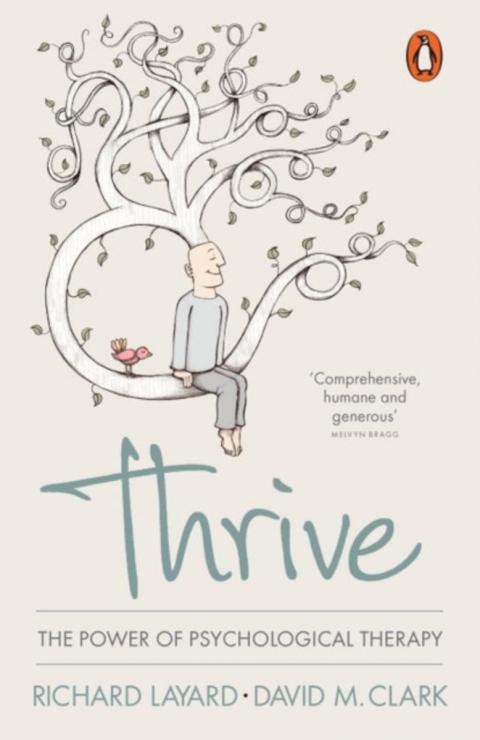
A ground-breaking argument for better treatment of mental health from Richard Layard (author of Happiness) and David M. Clark. Britain has become a world leader in providing psychological therapies thanks to the work of Richard Layard and David Clark. But, even so, in Britain and worldwide the majority of people who need help still don't get treatment. This is both unjust and a false economy. This book argues for change. It shows that mental ill-health causes more of the suffering in our society than physical illness, poverty or unemployment. Moreover, greater spending on helping people to recover from mental health problems - and stay well - would generate massive savings to national economies, as those who suffer from depression and anxiety disorders account for nearly a half of all disability and are predominantly of working age. Modern talking therapies, such as CBT (Cognitive Behavioural Therapy), are highly effective, and if more sufferers got these treatments, lives would be turned around and the cost would be fully covered by the huge savings. Thrive explores the new effective solutions to the misery and injustice caused by mental illness. It describes how successful psychological treatments have been developed and explains what works best for whom. It also urges us to do all we can to prevent these problems in the first place, through better schools and a better society. And, most importantly, it offers real hope. 'This book is an inspiring success story and a stirring call to further action. Its message is as compelling as it is important: the social costs of mental illness are terribly high and the costs of effective treatments are surprisingly low' Daniel Kahneman 'Extremely easy and pleasurable to read. It's the most comprehensive, humane and generous study of mental illness that I've come across' Melvyn Bragg 'Remarkable . . . presents the issues in a style that easy for the professional, the general public, and policy makers to understand' Aaron T Beck 'Professors Layard and Clark (the Dream Team of British Social Science) make a compelling case for a massive injection of resources into the treatment and prevention of mental illness. This is simply the best book on public policy and mental health ever written' Martin Seligman RICHARD LAYARD is one of the world's leading labour economists, and in 2008 received the IZA International Prize for Labour Economics. A member of the House of Lords, he has done much to raise the public profile of mental health. His 2005 book Happiness has been translated into 20 languages. DAVID M. CLARK, Professor of Psychology at Oxford, is one of the world's leading experts on CBT, responsible for much progress in treatment methods. With Richard Layard, he was the main driver behind the UK's Improving Access to Psychological Therapies programme.
Waarom de wereld niet naar de knoppen gaat.
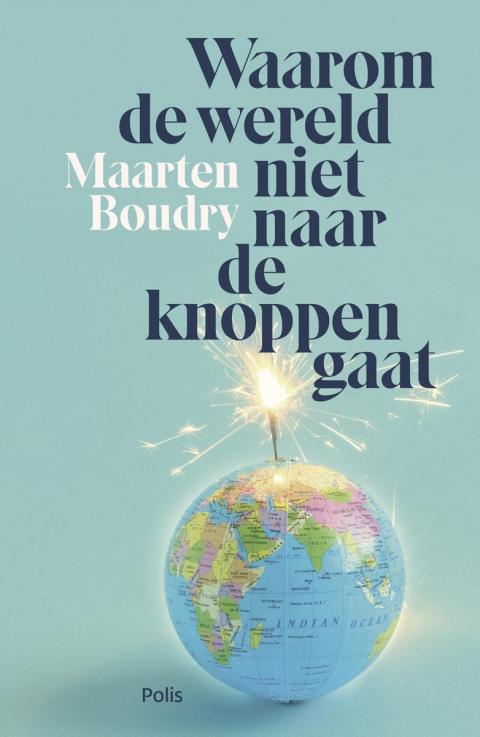
Nog nooit leefden we zo lang, zo welvarend en zo vreedzaam als vandaag. Kan dit mooie liedje blijven duren? Doemdenkers verkondigen dat we op de rand van de afgrond staan, cultuurpessimisten dat onze moderne samenleving aan een diepe malaise lijdt. In Waarom de wereld niet naar de knoppen gaat breekt Maarten Boudry een lans voor het vooruitgangsdenken. Hij bestrijdt het wijdverbreide pessimisme en zoekt naar verklaringen voor de doembeelden over klimaat en islamisering, over groeiend racisme en ongelijkheid en over de diepe wanhoop van de westerse mens. Boudry pleit voor de beproefde waarden van wetenschap en verlichting. Doemdenken leidt niet tot daadkracht maar tot fatalisme, terwijl vooruitgangsdenken net wervend is. De wereld stond er nog nooit zo goed voor als vandaag, en we kunnen haar nog veel beter maken.
Hoera de democratie is niet perfect
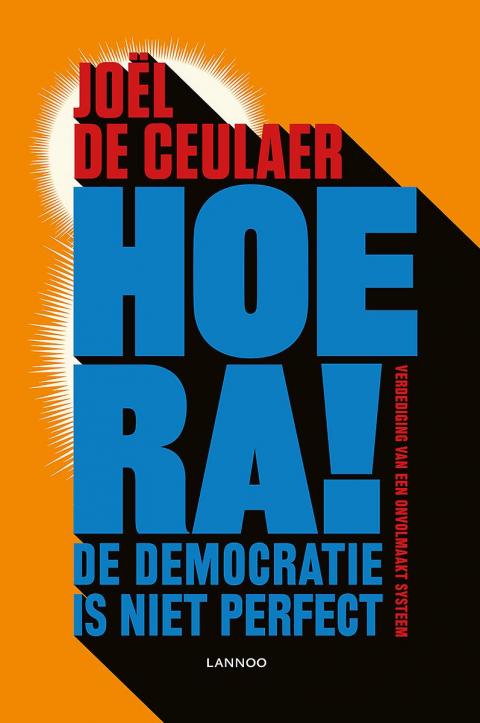
Verdediging van een onvolmaakt systeem.
Het wordt zo vaak herhaald dat bijna iedereen het intussen gelooft: onze democratie bevindt zich in een diepe crisis. Ze is chronisch vermoeid, werkt veel te traag en lijdt aan hoge electorale koorts. Daarom wordt er vaak op afgegeven en zoeken sommigen het zelfs in alternatieven als deliberatie en loting, ter vervanging van of aanvulling op de klassieke verkiezingen.
Journalist Joël De Ceulaer begon zich steeds meer te ergeren aan dit crisisgevoel en verdiepte zich in de historische wortels en politiek-filosofische eigenschappen van ons systeem. De échte crisis van de democratie, schrijft hij, is misschien wel dat zoveel intellectuelen er niet meer in geloven. Mede aan de hand van interviews met een groot aantal experts probeert De Ceulaer ons vertrouwen in de representatieve democratie te herstellen, door de fundamentele gebreken ervan - zes, om precies te zijn - messcherp te analyseren en toe te lichten.
Dit boek is een verhelderende zoektocht naar de grondslagen van onze vertegenwoordigende democratie en een verfrissend geluid in de aanzwellende kakofonie van doemdenkers. Het belicht ook uitgebreid de actuele discussie over mensenrechten en doet concrete aanbevelingen voor wie ons systeem genegen is.
The Deep History Of Ourselves
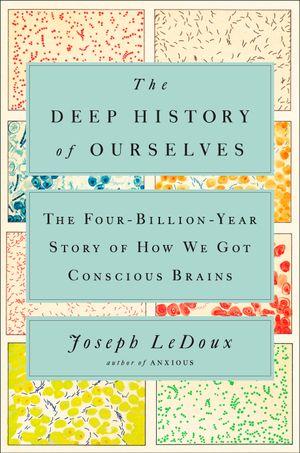
The Four-Billion-Year Story of How We Got Conscious Brains.
A leading neuroscientist offers a history of the evolution of the brain from unicellular organisms to the complexity of animals and human beings today**
Renowned neuroscientist Joseph LeDoux digs into the natural history of life on earth to provide a new perspective on the similarities between us and our ancestors in deep time. This page-turning survey of the whole of terrestrial evolution sheds new light on how nervous systems evolved in animals, how the brain developed, and what it means to be human.
In The Deep History of Ourselves, LeDoux argues that the key to understanding human behavior lies in viewing evolution through the prism of the first living organisms. By tracking the chain of the evolutionary timeline he shows how even the earliest single-cell organisms had to solve the same problems we and our cells have to solve each day. Along the way, LeDoux explores our place in nature, how the evolution of nervous systems enhanced the ability of organisms to survive and thrive, and how the emergence of what we humans understand as consciousness made our greatest and most horrendous achievements as a species possible.
The Ape that Understood the Universe
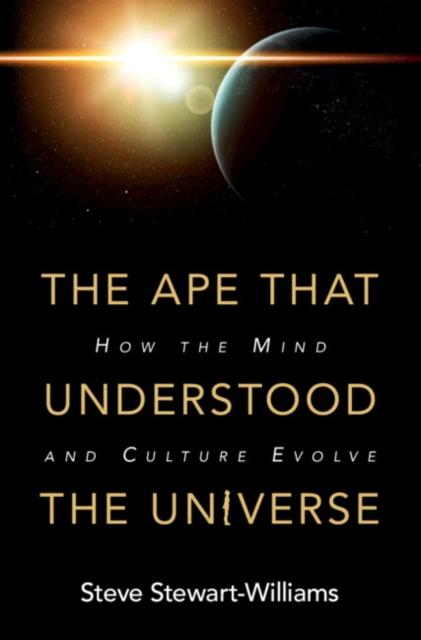
The Ape that Understood the Universe is the story of the strangest animal in the world: the human animal. Looking at our species through the eyes of an alien scientist, the book is framed as answer to the alien's questions about how our minds and culture evolved.
Enlightenment now
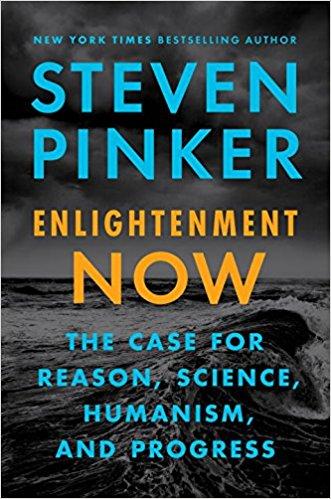
The follow-up to Pinker's pathbreaking The Better Angels of Our Nature argues that despite the rampant pessimism about the state of the world today, the facts prove that we are on a significant path upward and can continue that way, but only if we understand the ideals (and embrace the tools) that have created that progress. A necessary counter to the current gospel of doom.
Are things really going to hell in a handbasket? In this elegant and urgent assessment of the human condition in the third millennium,cognitive scientist and public intellectual Steven Pinker proves that--despite the robust market for prophecies of woe--we're living longer, healthier, safer, richer, freer, happier, and more meaningful lives worldwide. The problems we face are formidable, but we have the tools to solve them. Our best days are, indeed, still ahead of us.
Progress is not inevitable, or the result of some mysterious force, he argues; it is the fruit of a system of beliefs and values that many of us embrace without even realizing it. These are the ideals of the Enlightenment: the conviction that we can use reason and science to enhance human flourishing. Far from being a naïve dream, the Enlightenment, we now know, has worked. Pinker shows in more than sixty jaw-dropping graphs that humanity is far better off than it was decades and centuries ago. But because of our cognitive and moral biases, we overlook this progress and prefer to sermonize about decline and despair
This myopia is dangerous, Pinker argues. It makes us sink into a paralyzing cynicism, demonize enemies instead of solve problems, and embrace demagogues and political and religious radicalism. But science and reason have given us a deep understanding of life and the cosmos, the conquest of pestilence and famine, and the precious gift of liberal democracy. The tools for to help us continue to survive and thrive are in our hands.
A Skeptic's HR Dictionary The ultimate self-defense guide for CEOs, HR professionals, I/O students and employees
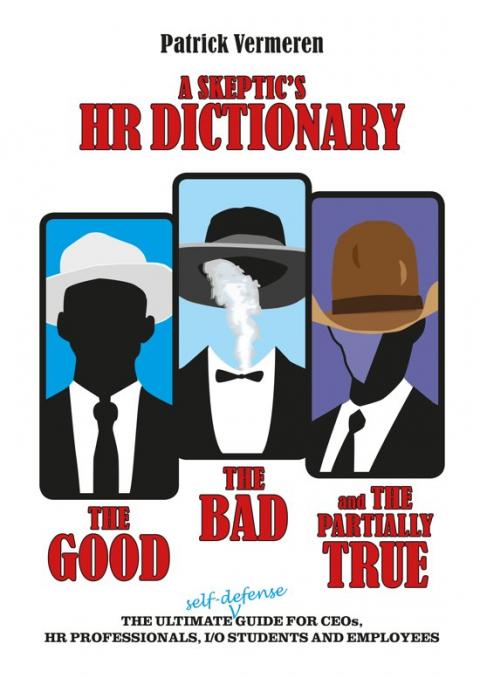
Have you ever wondered what goes on in HR departments at corporations, universities, government agencies, and the like?
They claim to perform vital tasks and provide valuable resources for employees, but do they? They engage many different programs, but do they work? They claim that they do, but how do they know?
In this new book, A Skeptic's HR Dictionary, you will find the answers to these questions and many more, and the discover the good, the bad and the partially true in HR programs based on what the best science tells us, rather than what anecdotes and testimonials say.
Science is the best tool ever employed by humanity to determine what is real and what works, and there is no reason why HR claims should not be subjected to the same rigorous standards as any other entity and its claims.
We have science-based medicine, why not science-based Human Resources?